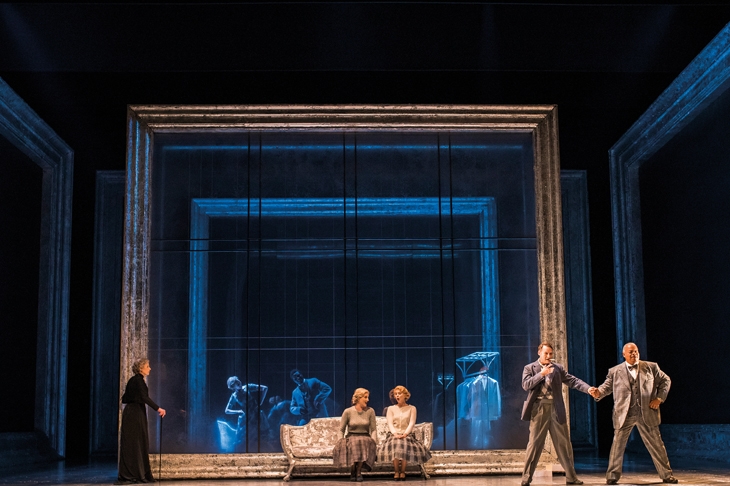‘Outside this house the world has changed. Life is swifter than before; there is no time for idle gestures.’ Anatol, in Samuel Barber’s opera Vanessa, doesn’t pretend to be a romantic hero. The son of Vanessa’s old flame, he’s arrived by night at the remote mansion where she’s waited for 20 years with her elderly mother and niece Erika. He seduces the niece, beguiles the aunt and alienates the grandmother, but at no point is he anything less than honest. ‘I cannot offer you eternal love, for we have learned today such words are lies’, he sings, and Barber, remarkably, takes him at face value. Anatol’s music is lyrical and open; a shaft of light in Barber and his librettist Menotti’s claustrophobic world. It won’t be remotely enough to carry the day.
Nothing in Vanessa is quite as predictable as its lustrous surface suggests. It was premièred at the New York Metropolitan Opera in 1958, and won a Pulitzer Prize. But outside that house the world really had changed. Transferred with fanfare to the Salzburg Festival, Vanessa was frozen out by local critics in a spasm of anti-Americanism. It’s never had a full production in the UK, though when Alexandra Coghlan saw it at Wexford in 2016 she judged it ‘the real deal’, and I’ve been excited all summer by the prospect of Keith Warner’s new production at Glyndebourne — effectively its UK première.
The good news is that it’s magnificent. Barber’s music defines the whole thing, and imagine the sonic equivalent of a painting by John Piper — the angular ink outlines overlaid with sudden, lurid washes of lemon-yellow or blood-red, and behind it all those lowering, storm-swept skies. It’s as brazenly jagged and mid-century modern as you like; but it can clear in an instant. Tender, flute-tinted idylls turn bitter as a melody trails off into the dusk.
Equally, think Bernard Herrmann. Warner has updated the drama to the 1950s and presented it as a noir-ish psychological thriller straight out of Hitchcock. Vanessa (Emma Bell) and Erika (Virginie Verrez) embody the blonde icons of their generations, the 1930s and 1950s respectively; the Old Baroness (Rosalind Plowright) is a gaunt, judgmental figure in Edwardian mourning dress. Around them, designer Ashley Martin-Davis’s towering gilt-framed mirrors slide and shift. Sheets of grey satin ripple in the background. The mirrors blur reality, memory and dream as video projections flicker over them, and at the drama’s cruellest climax they fly apart completely to leave the characters alone with the cold reality.
Reality, laid bare, is the most dangerous thing in Vanessa. There’s only one genuinely uncomplicated major character, the old family Doctor (touchingly sung by Donnie Ray Albert), and it’s clear that he’s deluded too. Anatol is a chancer — in Edgaras Montvidas’s louche portrayal, he’s always got a cigarette in one hand, and his cool, pale tenor voice wouldn’t be any dispassionate observer’s idea of seductive. Erika is broken less by what Anatol is than by what he isn’t. Verrez, wide-eyed beneath her perky bob, sang with a fierce radiance that revealed a brittle edge — a shattering piece of vocal characterisation, heightened by Warner’s stylised, intentionally melodramatic movement direction.
Vanessa, meanwhile, invests everything in a self-evidently hollow dream of love —with Bell positively blazing as she claims her false prize. We’ve already heard her vulnerability; Bell floats Vanessa’s quieter music with caressing softness, before lighting up the whole auditorium with a surge of sound whose intensity almost — but not quite — cancels any doubts about the depths of her character’s self-deception. And Barber backs her all the way. This is a world in which, for sheer emotional conviction, reality is defeated on every front by illusion, and the orchestra — taut, headstrong and sumptuously coloured under Jakub Hrusa — is a troublingly unreliable narrator.
In short, these are wonderful performances and this is a beautiful, thought-provoking production of an opera that toys, cat-like, with your intellect even as it tears at your heart. Vanessa waits 20 years for Anatol; we’ve had to wait 60 years for Vanessa, but the quality of this opera, and this production, is no delusion. It’s a sophisticated, thoroughly grown-up treat, and it’s on all month. Please, go — you’ll thank us.






Comments